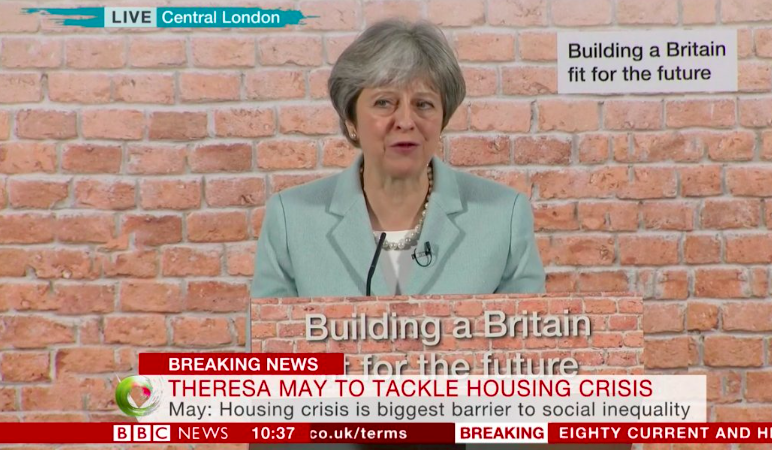From growing homelessness and social housing waiting lists to dropping house building, the Tories have utterly failed to address the housing crisis.

In the face of a worsening housing crisis, it is difficult to understate how inadequate Theresa May’s speech yesterday was in proposing a coherent strategy to fix Britain’s broken housing market.
May’s proposals were almost entirely centred upon accelerating the planning process rather than reversing draconian cuts to social and affordable housing funding under George Osborne in 2010.
But even on the planning front, the approach is to call on house-builders and so-called NIMBY councils in the Tory shires to ‘do their duty’ in up-scaling house-building efforts and allocating green-belt land for new housing.
That the Tories housing strategy has failed is evidenced by the government’s increase in its house-building target from 200,000 new homes annually in 2010 to 300,000 by the mid-2020s.
Newish Housing Minister Dominic Raab trailed May’s speech around the weekend television studios and seemed oblivious to the fact that his party has been in power for eight years; insisting on referring (inaccurately) to the housing record of the last Labour government.
Raab is the seventh Housing Minster in eight years who needs to face up to the scale of the housing crisis before anything seriously can be achieved:
- House-building under the Tories since 2010 has averaged only 123,000 per year compared with 189,000 under Blair and Brown. And there are now more than 200,000 homes in England that have been empty for more than six months.
- Statutory homelessness has increased by 48% since the Tories came to power in 2010, while rough sleeping has risen by 168% to stand at 5,000. There are now nearly 80,000 families in temporary accommodation (such as homeless hostels and bread and breakfast hotels) – a 50% upswing in seven years.
- Some 1.2m families, or 5m individuals, are registered on local council waiting lists. While this is lower than the highpoint of 2012, when 1.8m families were waiting for social housing, lower numbers have only been recorded because of (mainly) Tory shires taking advantage of the Localism Act 2011 to restrict registration eligibility criteria, and not because of any reduction in housing need.
- Levels of poor, hazardous and overcrowded housing are on the rise, affecting the educational attainment of children and the physical and mental health of residents. It is estimated that poor housing costs the NHS £1.4bn annually.
- There has been a negligible increase in social housing, due mainly to programmes begun under the last Labour government. The social housing stock has been depleted by 82,000 sales of homes under the Right to Buy. Over the longer-term, there are 1.4m fewer social homes than in 1979, even as demand has increased; shown in the rise in household formation by 6.8m over the same period.
- The affordability of home ownership and private renting has worsened in recent years, following some improvement in the immediate aftermath of the international financial crisis in 2007/08. The average home is now priced at over eight times average earnings. And the average private sector rent takes up more than half of tenants’ incomes.
- The marketization of the social housing sector continues, with housing associations now concentrating almost exclusively on shared ownership and sub-market renting, where rents average 50% higher than social rents.
- Social tenants, despite efforts from the social housing sector, continue to be stigmatised and stereotyped by the tabloid media, and some in government. At the same time, social tenants have seen their incomes eroded by inflation because of stagnant wages and cuts in welfare benefits since 2010. Two thirds are placed in the lowest third of the income spectrum.
Kevin Gulliver is Director of Birmingham-based research charity the Human City Institute, former Chair of the Centre for Community Research, and part of the SHOUT save social housing campaign, but writes in a personal capacity. He tweets here.
To reach hundreds of thousands of new readers we need to grow our donor base substantially.
That's why in 2024, we are seeking to generate 150 additional regular donors to support Left Foot Forward's work.
We still need another 117 people to donate to hit the target. You can help. Donate today.



